七年级英语(下)第六课
- 格式:doc
- 大小:36.00 KB
- 文档页数:5
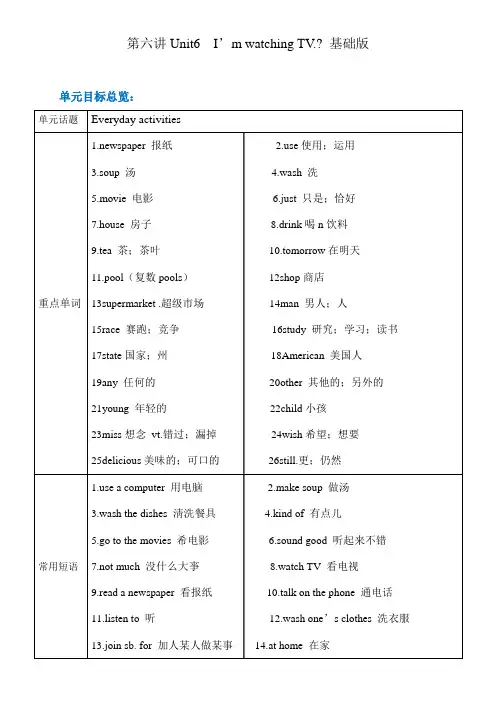
第六讲Unit6 I’m watching TV.? 基础版单元目标总览:【知识点详解】1、What are you doing? 你在做什么?这是一个现在进行时的特殊疑问句,询问别人正在做什么。
它的结构是“特殊疑问词+be+主语+doing+其他+?”。
对于特殊疑问句的回答,要根据实际情况来定。
例如:◆-What is your mother doing? 你妈妈在做什么?-She is watering the flowers. 她在浇花。
◆-Who is playing the piano? 谁在弹钢琴?-My sister. 我姐姐/妹妹。
◆-What’s she doing? 她正在什么?-She is washing her clothes. 她正在洗衣服。
2、reading a newspaper看报纸(1)newspaper意为“报纸”,是可数名词。
“在报纸上”用英语表示为“in the/a newspaper”,不能用介词on。
我们日常所说的晨报/晚报是morning / evening newspapers。
◆She likes collecting old newspapers. 她喜欢收集旧报纸。
(2)newspaper是由news和paper构成的合成词,合成词是一种重要的构词法,对我们记忆单词很有帮助。
例如:bed + room→ bedroom 卧室class + room →classroom 教室head + phone →headphone 耳机police + man→ policeman 警察basket + ball→basketball 篮球3、talking on the phone通过电话交谈On the phone意为“通过电话”,其中on为介词,意为“通过;以......的方式”。
◆The boy is talking on the phone with his friends.这个男孩和朋友在打电话。
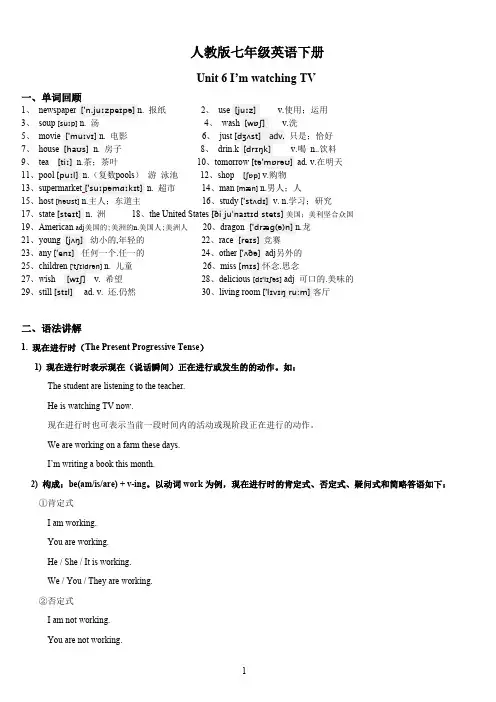
人教版七年级英语下册Unit 6 I’m watching TV1、报纸2、use [juːz]v.使用;运用3、4、wash [wɒʃ]v.洗5、6、just [dʒʌst]adv.只是;恰好7、8、drin.k [drɪŋk]v.喝n..饮料9、tea 10、tomorrow [tə'mɒrəʊ] ad. v.在明天11、游泳池12、shop [ʃɒp] v.购物13、超市14、man [mæn] n.男人;人15、16、study ['stʌdɪ] v. n.学习;研究17、the United States [ði juˈnaɪtɪd stets]美国;美利坚合众国19、adj美国的;美洲的n.美国人;美洲人20、dragon ['dræg(ə)n]n.龙21、young [jʌŋ]幼小的,年轻的22、race [reɪs]竞赛23、any ['enɪ]任何一个.任一的24、other ['ʌðə] adj另外的25、children ['tʃɪldrən] n. 儿童26、miss [mɪs]怀念.思念27、wish [wɪʃ]v. 希望28、delicious [dɪ'lɪʃəs] adj 可口的.美味的29、still [stɪl]ad. v. 还.仍然30、living room ['lɪvɪŋ ru:m]客厅二、语法讲解1. 现在进行时(The Present Progressive Tense)1) 现在进行时表示现在(说话瞬间)正在进行或发生的的动作。
如:The student are listening to the teacher.He is watching TV now.现在进行时也可表示当前一段时间内的活动或现阶段正在进行的动作。
We are working on a farm these days.I’m writing a book this month.2) 构成:be(am/is/are) + v-ing。
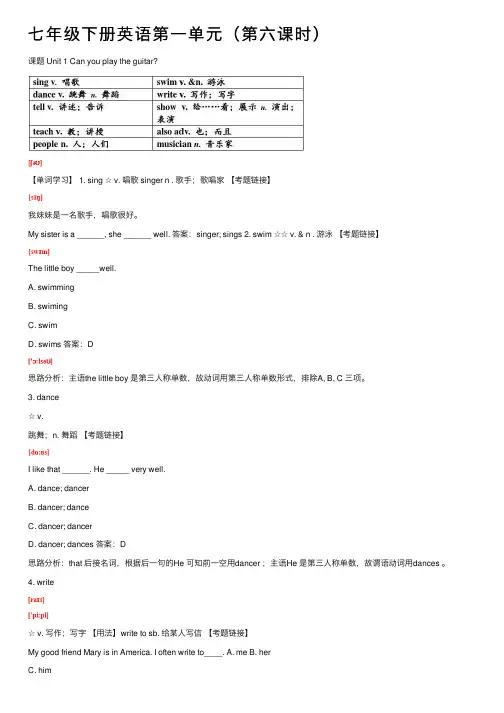
七年级下册英语第⼀单元(第六课时)课题 Unit 1 Can you play the guitar?【单词学习】 1. sing ☆ v. 唱歌 singer n . 歌⼿;歌唱家【考题链接】我妹妹是⼀名歌⼿,唱歌很好。
My sister is a ______, she ______ well. 答案:singer; sings 2. swim ☆☆ v. & n . 游泳【考题链接】The little boy _____well.A. swimmingB. swimingC. swimD. swims 答案:D思路分析:主语the little boy 是第三⼈称单数,故动词⽤第三⼈称单数形式,排除A, B, C 三项。
3. dance☆ v.跳舞;n. 舞蹈【考题链接】I like that ______. He _____ very well.A. dance; dancerB. dancer; danceC. dancer; dancerD. dancer; dances 答案:D思路分析:that 后接名词,根据后⼀句的He 可知前⼀空⽤dancer ;主语He 是第三⼈称单数,故谓语动词⽤dances 。
4. write☆ v. 写作;写字【⽤法】write to sb. 给某⼈写信【考题链接】My good friend Mary is in America. I often write to____. A. me B. herC. himD. she 答案:B思路分析:to 是介词,后接⼈称代词的宾格形式。
故排除D 项,因为它是主格;根据句意“我的好朋友玛丽在美国。
我经常给她写信”,玛丽是⼀⼥孩,⽤her ,排除A, C 两项。
5. tell ☆☆ v. 讲述;告诉【⽤法】(1)tell sb. sth. = tell sth. to sb. 告诉某⼈某事,tell 后接双宾语(直接宾语和间接宾语)(2)tell sb. to do sth. 告诉某⼈去做某事(3)tell sb. about sth.告诉某⼈关于某事【考题链接】My brother wants ______.A. to tell us storyB. to tell us a storyC. tell us a storyD. tell us stories 答案:B思路分析:want 后接动词不定式,故排除C ,D 两项;story 是可数名词,故⽤a story 或stories ,所以B 项正确。
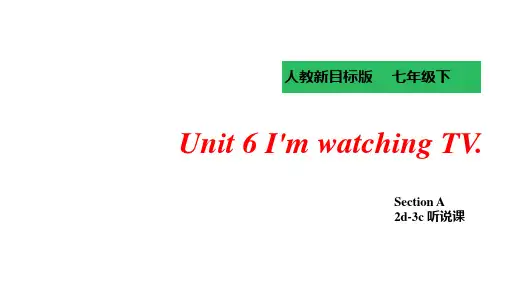
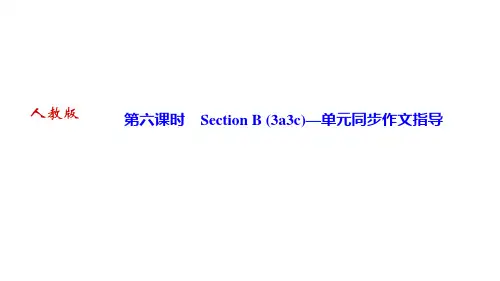
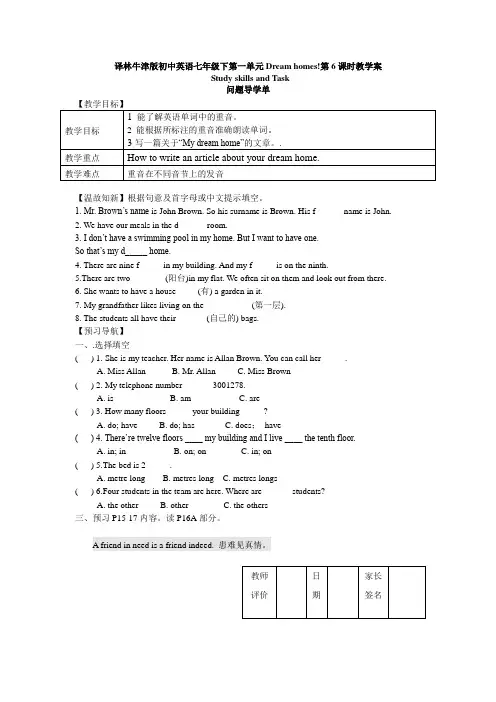
译林牛津版初中英语七年级下第一单元Dream homes!第6课时教学案Study skills and Task问题导学单【温故知新】根据句意及首字母或中文提示填空。
1. Mr. Brown’s name is John Brown. So his surname is Brown. His f______ name is John.2. We have our meals in the d______ room.3. I don’t have a swimming pool in my home. But I want to have one.So that’s my d_____ home.4. There are nine f_____ in my building. And my f_____ is on the ninth.5.There are two _______ (阳台)in my flat. We often sit on them and look out from there.6. She wants to have a house ____ (有) a garden in it.7. My grandfather likes living on the __________ (第一层).8. The students all have their ______ (自己的) bags.【预习导航】一、.选择填空( ) 1. She is my teacher. Her name is Allan Brown. You can call her _____.A. Miss AllanB. Mr. AllanC. Miss Brown( ) 2. My telephone number ______ 3001278.A. isB. amC. are( ) 3. How many floors _____ your building _____?A. do; haveB. do; hasC. does ; have( ) 4. There’re twelve floors ____ my building and I live ____ the tenth floor.A. in; inB. on; onC. in; on( ) 5.The bed is 2 _____.A. metre longB. metres longC. metres longs( ) 6.Four students in the team are here. Where are ______ students?A. the otherB. otherC. the others三、预习P15-17内容。
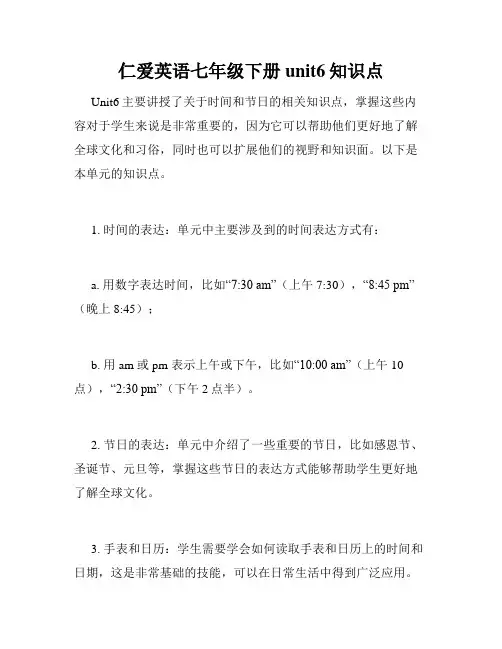
仁爱英语七年级下册unit6知识点Unit6主要讲授了关于时间和节日的相关知识点,掌握这些内容对于学生来说是非常重要的,因为它可以帮助他们更好地了解全球文化和习俗,同时也可以扩展他们的视野和知识面。
以下是本单元的知识点。
1. 时间的表达:单元中主要涉及到的时间表达方式有:a. 用数字表达时间,比如“7:30 am”(上午7:30),“8:45 pm”(晚上8:45);b. 用 am 或 pm 表示上午或下午,比如“10:00 am”(上午10点),“2:30 pm”(下午2点半)。
2. 节日的表达:单元中介绍了一些重要的节日,比如感恩节、圣诞节、元旦等,掌握这些节日的表达方式能够帮助学生更好地了解全球文化。
3. 手表和日历:学生需要学会如何读取手表和日历上的时间和日期,这是非常基础的技能,可以在日常生活中得到广泛应用。
4. 时间的比较:学生需要学会利用单元中所涉及的单词和短语,比较不同时间段之间的差别,例如:morning(上午)和 afternoon (下午)的时间差,小时和分钟的差别等等。
5. 祈使句:本单元中也介绍了各种各样的祈使句,例如:“turn left”(向左转)、“open your book”(打开你的书)等等。
这些祈使句非常常见,也是学生口头表达和书面表达的重要基础。
6. 时间和节日的阅读理解:单元中也涉及到了一些有关时间和节日的阅读理解,包括短文和问题,这可以帮助学生更好地理解所学内容并掌握相关技能和知识点。
总结:本单元的内容涉及到了时间和节日的相关知识点,在日常生活中非常重要,掌握好这些内容可以帮助学生更好地了解全球文化和习俗,扩展他们的视野和知识面。
同时,这些内容也是学生书面表达和口头表达的基础,是他们日后学习英语的重要支撑。
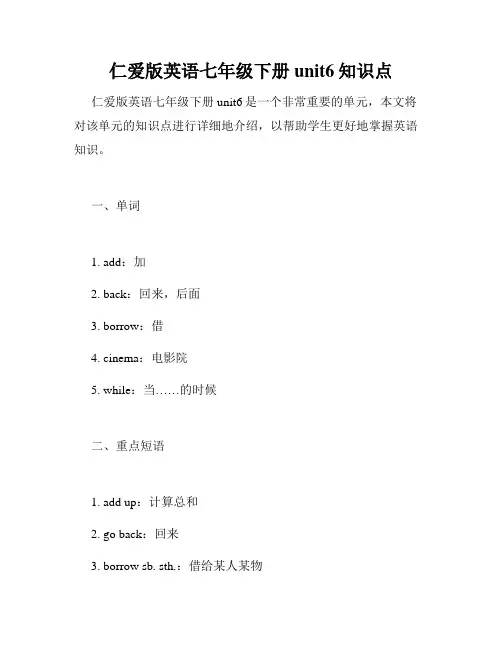
仁爱版英语七年级下册unit6知识点仁爱版英语七年级下册unit6是一个非常重要的单元,本文将对该单元的知识点进行详细地介绍,以帮助学生更好地掌握英语知识。
一、单词
1. add:加
2. back:回来,后面
3. borrow:借
4. cinema:电影院
5. while:当……的时候
二、重点短语
1. add up:计算总和
2. go back:回来
3. borrow sb. sth.:借给某人某物
4. go to the cinema:去电影院
5. while doing:在做……的时候
三、语法
1. There be句型
There be句型表示“有”、“存在”之意,例如:There is a book on the desk.即桌子上有一本书。
2. 句型I'm + doing sth.
这种结构常用来表达我们正在做某件事情,例如:I'm playing basketball. 即我正在打篮球。
四、例句
1. There is a cinema near our school.(我们学校附近有一家电影院。
)
2. I'm studying English while listening to music.(我边听音乐边学英语。
)
3. Can I borrow your pen for a moment?(我可以借用你的笔一下吗?)
总结
通过对仁爱版英语七年级下册unit6的学习,我们了解了很多单词、短语和语法结构。
好的掌握这些知识点,一定会对我们的英语学习帮助很大。
希望大家能够认真学习,并不断提高自己的英语能力。
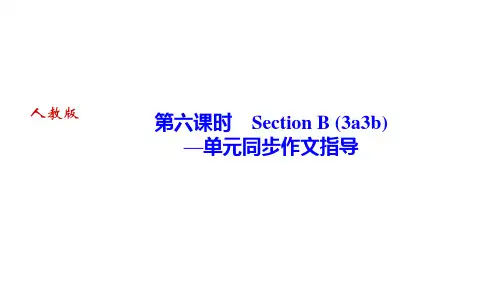
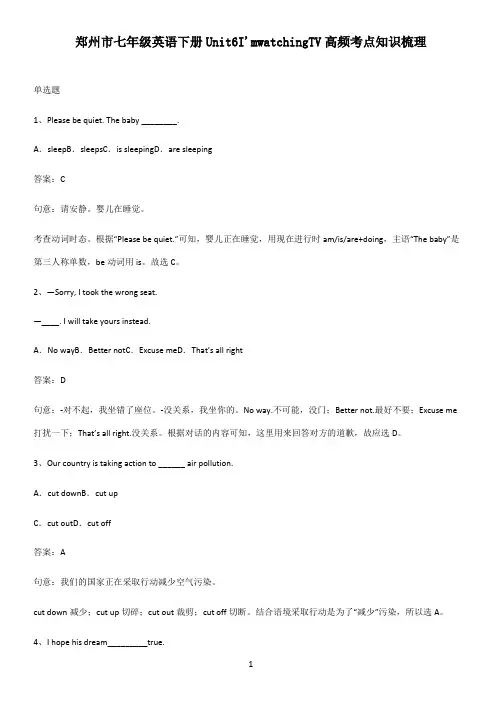
郑州市七年级英语下册Unit6I'mwatchingTV高频考点知识梳理单选题1、Please be quiet. The baby ________.A.sleepB.sleepsC.is sleepingD.are sleeping答案:C句意:请安静。
婴儿在睡觉。
考查动词时态。
根据“Please be quiet.”可知,婴儿正在睡觉,用现在进行时am/is/are+doing,主语“The baby”是第三人称单数,be动词用is。
故选C。
2、—Sorry, I took the wrong seat.—____. I will take yours instead.A.No wayB.Better notC.Excuse meD.That’s all right答案:D句意:-对不起,我坐错了座位。
-没关系,我坐你的。
No way.不可能,没门;Better not.最好不要;Excuse me 打扰一下;That’s all right.没关系。
根据对话的内容可知,这里用来回答对方的道歉,故应选D。
3、Our country is taking action to ______ air pollution.A.cut downB.cut upC.cut outD.cut off答案:A句意:我们的国家正在采取行动减少空气污染。
cut down减少;cut up切碎;cut out裁剪;cut off切断。
结合语境采取行动是为了“减少”污染,所以选A。
4、I hope his dream_________true.A.to comeB.comesC.comingD.to coming答案:B句意:我希望他的梦想能实现。
考查谓语。
hope可以直接跟动词不定作式宾语或者后跟宾语从句,但是不跟动词不定式作宾补,故A不对;此处为宾语从句,主语his dream为第三人称单数,从句谓语用三单形式,故选B。
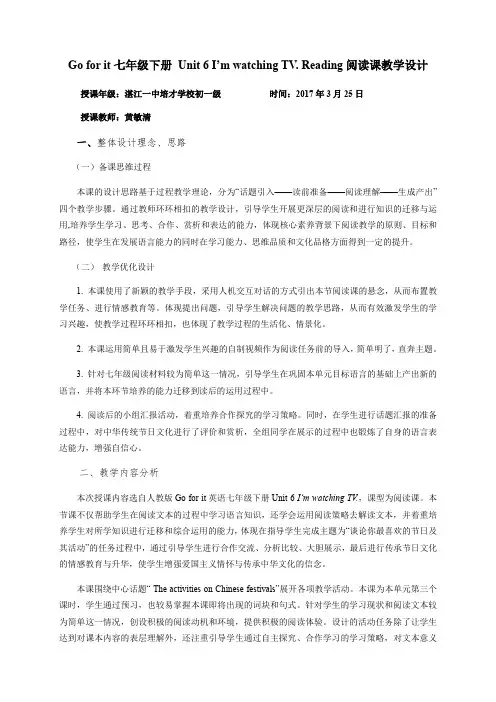
Go for it七年级下册Unit 6 I’m watching TV. Reading阅读课教学设计授课年级:湛江一中培才学校初一级时间:2017年3月25日授课教师:黄敏清一、整体设计理念、思路(一)备课思维过程本课的设计思路基于过程教学理论,分为“话题引入——读前准备——阅读理解——生成产出”四个教学步骤。
通过教师环环相扣的教学设计,引导学生开展更深层的阅读和进行知识的迁移与运用,培养学生学习、思考、合作、赏析和表达的能力,体现核心素养背景下阅读教学的原则、目标和路径,使学生在发展语言能力的同时在学习能力、思维品质和文化品格方面得到一定的提升。
(二)教学优化设计1. 本课使用了新颖的教学手段,采用人机交互对话的方式引出本节阅读课的悬念,从而布置教学任务、进行情感教育等。
体现提出问题,引导学生解决问题的教学思路,从而有效激发学生的学习兴趣,使教学过程环环相扣,也体现了教学过程的生活化、情景化。
2. 本课运用简单且易于激发学生兴趣的自制视频作为阅读任务前的导入,简单明了,直奔主题。
3. 针对七年级阅读材料较为简单这一情况,引导学生在巩固本单元目标语言的基础上产出新的语言,并将本环节培养的能力迁移到读后的运用过程中。
4. 阅读后的小组汇报活动,着重培养合作探究的学习策略。
同时,在学生进行话题汇报的准备过程中,对中华传统节日文化进行了评价和赏析,全组同学在展示的过程中也锻炼了自身的语言表达能力,增强自信心。
二、教学内容分析本次授课内容选自人教版Go for it英语七年级下册Unit 6I’m wa tching TV.,课型为阅读课。
本节课不仅帮助学生在阅读文本的过程中学习语言知识,还学会运用阅读策略去解读文本,并着重培养学生对所学知识进行迁移和综合运用的能力,体现在指导学生完成主题为“谈论你最喜欢的节日及其活动”的任务过程中,通过引导学生进行合作交流、分析比较、大胆展示,最后进行传承节日文化的情感教育与升华,使学生增强爱国主义情怀与传承中华文化的信念。
初一英语Unit 6 Do you like bananas? 人教版(新目标)【本讲教育信息】一. 教学内容:Unit 6 Do you like bananas?(一)语言目标谈论爱好和厌恶。
(二)语言功能学会用英语表达自己喜欢或不喜欢的东西,询问别人是否喜欢,提出建议。
(三)重点句型Do you like bananas? Yes, I do./No, I don’t.I like French fries. I don’t like tomato es.(四)主题词表(五)重点词汇及短语词汇:like, hamburgers, tomatoes, broccoli, French fries, oranges, ice cream, salad, bananas, eggs, carrots, strawberry, apples, chicken, breakfast, lunch, dinner, fruit, vegetable.短语:a lot of like to do sth. like doing sth.(六)语法1. 动词like的用法。
2. 一般疑问句的肯定、否定回答。
3. 名词复数的使用。
(七)重难点分析:1. 可数名词和不可数名词(1)可数名词:①定义:是可以计数的名词。
②可数名词前可以用a,an限定。
③可数名词前可以用one,two,three…限定。
④可数名词有复数形式。
(2)不可数名词:①定义:指不能计数的名词。
②不可数名词前不可以用a,an限定。
③不可数名词前不可以用one,two,three…限定。
④不可数名词没有复数形式。
2. 一般名词的复数形式(1)一般在名词词尾加-s。
如:banana-bananas(2)以-o,-s,-sh,-ch及-x结尾的名词,在词尾加-es构成复数形式。
如:tomato-tomatoes (3)有些以-o结尾的名词仍加-s。
人教版七年级下册unit6 What are you doing?教材分析:这个主题展开各种教学活动。
这节课内容包括SectionA1a-2c,涉及到的时态是现在实行时,它在整个知识体系中的地位非常重要,这是继一般现在时之后,学生初次接触的第二种时态,所以要掌握好它,学会谈论人们正在做什么。
本节课旨在创造一个轻松、愉快的学习交流环境,通过听、说、读、写来培养学生使用这些知识的水平。
二.学情分析:学生的英语学习气氛不怎么浓厚,学习热情也不太高,尤其是英语的听、说水平方面,很多学生不愿开口说英语,英语听力也比较薄弱。
针对这种情况,我把本节课的重点放在英语听说训练两方面,通过展开一些生动有趣的活动,增强英语听说训练,让学生熟悉掌握现在实行时态,并弄清楚它与一般现在时态的区别。
三、教学重点和难点:1.Important points(重点).1).Let the students master how to describe what people are doing.2).Master the phrases: talking on the phone、watching TV、doing homework、eating dinner、cleaning、reading.2.Difficult points(难点).1).Grasp and make use of simple conversations in English:--What are you doing? --I am watching TV.-- What is he doing?-- He is doing homework.2).let the students master the differences between the present tense and the present progressive tense.---What do you usually do on weekends?---I usually help my mother with the housework .---What are you doing?---I’m having an English class.四、教学目标:1.知识目标:1)词汇:make soup、read a newspaper、wash、use、eat out、go to movies.、reading、doing homework、talking on the phone .2)语法—Present progressive tense。
七年级下册英语第二单元课六翻译冀教版Lesson 6 Jenny's Diary第6课詹妮的日记Dear Diary,亲爱的日记,This is our last night in China.这是我们在中国的最后一晚。
We will fly home tomorrow.明天我们将会飞回家。
We did so much on this trip.这次旅行我们做了很多事情。
This afternoon, we went to see the Beijing Opera.今天下午,我们去看了京剧。
Wow! I loved the music and the colourful clothing.哇!我喜欢那音乐和彩色的服装。
Yesterday was a great day.昨天是很棒的一天。
In the afternoon, we went to the Great Wall.下午,我们去了长城。
It is amazing!太令人惊奇了!It is about 6300 kilometres long and over 2000 years old.它大约6300公里长,有2000多年的历史。
Then, in the evening, we went to the Bird's Nest.然后,晚上,我们去了鸟巢。
It is only a few years old,它才建没几年,but it is a very famous and beautiful building.但是它是一座非常有名且漂亮的建筑。
It held the 2008 Olympics.这里举办了2008年奥运会。
Danny looked for birds there.丹尼在那里寻找小鸟But of course - he didn't find any.但是当然-----他没有找到。
China is a great country.中国是一个伟大的国家Where else can you travel thousands of years back in time?你还可以在哪里在几千年的时光里旅行?We saw the Terra Cotta Warriors, the Walled City and the Yellow River.我们看到了兵马俑,有围城和黄河。
Unit 6 Topic 3 How can I get to the library讲解与练习Section A:1.问路用语:Is there a … near here? How can I get to …?Where is …?Which is theway to …?Could you (please)tell me the way to …?Do you know the way to …?指路用语:Go up/along…street (to the end ).Turn right/left at the +序数词+(street )Go across the bridge=cross the bridgeIt's about+数词+meters/kilometers along on the right/leftGo along this road until you get to +地点 Walk on 继续走You'll see it on your right /left. You can't miss it.You need to take bus No. then you should change to the No. busat +地点 It will take you there.It's about +数词+meters/kilometers away from here.2.get to +地点到达某地 4.Thank you all the same.仍然感谢3.across from 在…对面 on the corner of 在…和…拐角处Exercises:1. Is there a bank here? Go this street the end ,and you'll findyour left.2.How can I (到达)the bookstore.3. Go along Xinhua Street and turn left the first street.4. Go the bridge.(cross).5. The bookstore is the school.(在…对面)Section B:1.need to do sth. 需要做某事.2.乘…路公交车 take bus No. /take the No.3.How far 对距离提问 How long 对长度提问或对时间段提问 how old对年龄提问 Howoften 对频率提问Exercises:1.If you get up late ,you'll (错过)the early bus.2.I'll stay at home (一直到…) the rain stops.3.Nothing can (改变)Mr. Wang's idea.4.Our school is (两千米远)my home.5. Chang the No.300 bus LiuLi Bridge.6. It's about ten kilometers away from here.(对划线部分提问)Section C:1.get hurt 受伤 in the traffic accidents/an accident obey the rulers2.both :两者都… all 三者或三者以上都…3.way: n.①方向②道路 on the way to4. help sb. (to) do sth.5. on the street be late for 迟到5.It is +形容词+(for sb.)+to do sth.(对某人来说)做某事…样6.help ①名词 with the help of …在…的帮助下②动词 help sb. with sth. =helpsb. (to) do sth. Help oneself (to sth.)自助,自用(食物)等7.a ticket for speeding/drinking/parking in the wrong place/making a wrong turn18. wait for sb.等待某人 wait for one's turn 等着轮到某人Exercises:1.Every year many people (受伤)or (死亡) traffic accident.2.We must (遵守交通规则)3. In China, traffic keeps the rightthe road.4. It is good (help) children and old people (cross) the road .5.We must never play (在街道上) 8. Don't school. (迟到)6. (等着轮到你)when the lights are red.7. (保持安静)in class .Section D:1.call from a public phone 从公共电话处打电话2. at the traffic lights3.at the foot of 在…的脚下4.do some shopping=go shoppingExercises:A) 1. I'm (call) from a public phone the corner Zhichun Road andQiuzhi Street.2. Turn left the traffic lights.3. December is the t month of theyear.4. Maria can't r a boat. she is afraid of water.5. The children are c Children's Day in the school.6. Mary's father wants to buy a birthday cake and some c for her.7. The s of the box is rectangle.8. December is the t month of a year.9. Can you c from one to hundred, Jane?10. Students must be s in class, when the teacher is having class.11.S is the first day of the week. 12. We enjoy r on the lake on weekends.13. The boy f down from the bike and hurt himself.14. I feel so tired, because I often stay up until m these days.15. — What's two p seven? --It's nine.16. We are going to h a birthday party for her. 17. Children's Day is inJ .B)根据汉语意思填空.1.Can you (解答)the math problems, Polly ?2.I'm (恐怕)you can't.3.Tt's your (顺序)to sing song.4.At Kangkang's birthday party, Jane (玩得很很高兴)5. Look, your face is dirty. Go and wash it (立刻)6.Can you (照相)?7. (轮流)in playing the guitar.8.Everyone had (玩得愉快)at the party.9. (怎么样) Kangkang's birthday party?10.Don't play (电子游戏)on Sunday.11.I can perform ballet (也).12.Lucy go to bed (直到…才)Lily came back home.13.Tomorrow is February the (八日).14.We had a (令人惊喜的)party.C)单项选择.2( ) 1. Linda, please these flowers the classroom.A. bring, inB. take, inC. take, to( ) 2. What about there by bus, Tom? A. to go B. going C. goYou like music very much. Did you sing a song at the party? ---No, but —( ) 3.A. didB. doC. didn't Helen .any words. the blackboard, but I can't ( ) 4. I'mA. looking, seeB. looking at, seeC. seeing, look at( ) 5.She is going to buy a present her mother. A. to B. of C. forog and two hens in the picture. A. be B. is C. are ( ) 6. There a fr( ) 7. Please stop and have a rest, you be very thirsty.A. willB. mustC. shouldhospital yesterday. A. / B. a C. the ( ) 8. He was ill in( ) 9. February is from other members. It has 28 days or 29.A. differentB. sameC. funny( ) 10. Maria sang a song English the party.A. in, atB. in, inC. with, in( ) 11.Kangkang the candles out in one breath.A. blowsB. blowedC. blew--OK, . — Hurry up (赶快)!It's time to leave. ( )12. A . I'm coming.B.I came.C. I will come.( ) 13. -- What was the date yesterday? -- .A. It was June 2nd.B. It's May 8th, 1995.C. It was Sunday.photos C. photoes party.A. photoB. at will take of you the ( ) 14. I( ) 15. Michael America on a cold spring morning.A. leaveB. leavesC. left.句型转换D)) 改为否定句1. Jane came to school late yesterday morning. (Jane to school late yesterday morning.) 2. The recorder is 5 centimeters wide. (对划线部分提问Is the recorder?) 3. My brother can ride a motorbike. (改为一般疑问句 Brother a motorbike?? 4. What's the matter? (同义句转换) What's) 同义句转换4.He enjoyed himself at party.(He at the party.5. 1. Look! Jane (fly) a kite.2. I (find) many people in the room when I came in.3. He (go) to school at7:20 every day.4. Jane (play) the guitar for her friends last night.(dance) at Kangkang's party?5. -- Helen--Yes, she did. She (dance) very well.320XX—019学年度第一学期生物教研组工作计划指导思想以新一轮课程改革为抓手,更新教育理念,积极推进教学改革。
七年级下册Unit6《I’mwatchingTV》教学设计七年级下册 Unit 6 《I’m watching TV》教学设计作为一名为他人授业解惑的教育工作者,编写教学设计是必不可少的,教学设计是连接基础理论与实践的桥梁,对于教学理论与实践的紧密结合具有沟通作用。
教学设计应该怎么写才好呢?以下是店铺整理的七年级下册 Unit 6 《I’m watching TV》教学设计,希望对大家有所帮助。
一、设计理念1、以学生为主体,教师为主导新课程理念下的创新教学不仅仅是过去的“填鸭式”的教学,而是以学生发展为中心的师生共同参与的教学活动。
现在的英语课堂应是师生互动、心灵对话的舞台,而不是优秀教师展示授课技巧的表演场所。
课堂是学堂而不是讲堂,学生是教学中的主体,一个优秀的教师在课堂上只讲十几分钟,要把大量的时间换给学生,让他们交流、探究、质疑和消化,课堂是点燃学生智慧的火种,让学生走出教室的时候仍面对问号,怀抱好奇。
总之,焕发出生命活力的课堂才是理想的课堂,这样的课堂才是新课改所追求的课堂。
2、理论联系实际,培养学生的创新能力教育改革的一项重大任务就是要全面推进素质教育,培养学生的创新意识。
创新是一个民族的灵魂,是国家兴旺发达的动力。
教育并不是通常灌输,而是不断发现、发掘和强化学生的创造潜力,启迪学生的创造性思维,培养学生的创造精神,造就大批创新人才。
3、以学生终身发展为本教师在整个教学过程中要注意培养学生的自学能力,授之以“鱼”而不如授之以“渔”,使学生学会独立思考、会探究、会发现、会解决问题的能力,教师一定要为学生终身学习,提高综合素质奠定坚实的基础。
4、合理利用教材,做教材的主人教材在整个课程体系中具有重要的地位,但它并不是学生学习的唯一渠道。
教师应创造性地使用教材,积极开发和合理利用课程资源,教师一定利用好教材,是“用教材”而不是“教教材”。
现在的英语教材具有很大的开放性、灵活性和选择性,教师一定要因材施教,联系自己学生的实际情况,根据需求对教材内容作适当的补充和取舍,一定要重组教材,使教材内容更加符合学生需要,更贴近学生的实际生活,教师要做教材的主人而不是做教材的奴隶。
仁爱版七年级下册英语u6知识点仁爱版七年级下册英语u6知识点分为以下几个方面:一、主要语法知识点1.一般现在时态:表示现在或普遍真理。
2.一般过去时态:表示过去某个时刻或某一段时间内发生的动作或状态。
3.现在进行时态:表示现在正在进行的动作。
4.一般将来时态:表示将来某个时刻要发生的动作或情况。
5.情态动词can、must、should、may、might、could等:表示能力、建议、必须、可能等意义。
二、常用词汇根据本单元的主题,以下为常用词汇:1. planet 行星2. cloud 云3. universe 宇宙4. northern 北方的5. southern 南方的6. eastern 东方的7. western 西方的8. degree 度数9. temperature 温度10. frame 框架11. foundation 基础12. layer 层三、常用句型1. What do you think of...? 你认为......怎么样?2. How do you like...? 你喜欢......吗?3. What's the weather like today? 今天天气怎么样?4. It's sunny/cold/warm/hot today. 今天是晴天/冷天/温暖的天气/炎热的天气。
5. I'm interested in... 我对......感兴趣。
6. I think... 我认为......四、重点难点本单元重点难点为一般现在时、一般过去时、现在进行时、一般将来时的区别和使用;情态动词can、must、should、may、might、could的用法;句型What do you think of...?和How do you like...?的使用。
五、小结本单元主要介绍了关于天文学以及天气的相关词汇和语法,帮助学生理解并掌握一般现在时、一般过去时、现在进行时、一般将来时和情态动词can、must、should、may、might、could的用法,提高学生的语言运用能力和交流能力。
七年级英语第六课
UNIT 6 I’m watching TV
(请将下面的汉语翻译成英语)
一、分角色对话:
詹妮:喂?我是詹妮。
劳拉:嗨,詹妮,我是劳拉。
詹妮:噢,嗨,劳拉,你在做什么?
劳拉:没做什么,我只是在洗我的衣服。
你呢?
詹妮:我在看电视。
你想和我一起吃晚饭吗?我的父母不在家,我们可以在外面吃。
劳拉:好,我愿意。
詹妮:让我们先在我家见面。
六点半来吧。
劳拉:好,到时见。
Jenny: Hello? This is Jenny.
Laura: Hi, Jenny. It’s Laura here.
Jenny: Oh, hi, Laura. What are you doing?
Laura: Not much. I’m just washing my clothes. What about
you?
Jenny: I’m watching TV. Do you want to join me for dinner?
My parents aren’t at home. We can eat out. Laura: Yeah. I’d love to.
Jenny: Let’s meet at my home first. Come at half past six. Laura: OK. See you then.
二、为什么朱辉全家人在看船赛和包粽子?2.朱辉喜欢他的住宿家庭吗?他认为在中国的家怎么样?
今天的故事是关于来自深圳的一名学生,朱辉。
他现在正在美国学习,他在纽约,和一个美国人的家庭住在一起。
今天是端午节。
现在是上午九点,朱辉的家人在家里。
他的妈妈和婶婶正在包粽子。
他的爸爸和叔叔正在看船赛。
朱辉也在看船赛和吃粽子吗?好啦,现在是纽约时间下午九点,节日前的夜晚。
但是在美国没有端午节,因此,对于朱辉和他的寄宿家庭来说今晚和其他任何一个夜晚一样。
那位母亲正在给她的幼小的孩子们讲故事。
父亲正在通过电视看一场足球赛。
朱辉在干什么呢?他在和他深圳的表姑通过电话交谈,朱辉思念他的家人并希望吃上他妈妈的可口的粽子。
朱辉非常喜欢纽约和他的寄宿家庭,但仍然“没有比家里更好的地方。
Today’s story is about Zhu Hui, a student from Shenzhen. He’s now studying
in the United States. He’s living with an American
family in New York. Today is the Dragon Boat Festival. It’s 9:00 a.m. and Zhu Hui’s family are at home. His mom and aunt are making zongzi. His dad and uncle are watching the boat races on TV.
Is Zhu Hui also watching the races and eating zongzi? Well, it’s 9:00 p.m. in New York, and it’s the night before the festival. But there isn’t a Dragon Boat Festival in the US, so it’s like any other night for Zhu Hui and his host family. The mother is reading a story to her young children. The father is watching a soccer game on TV. And what’s Zhu Hui doing? He’s talking on the phone to his cousin in Shenzhen. Zhu Hui misses his family and wishes to have his mom’s delicious zongzi . Zhu Hui likes New York and his family a lot, but there’s still “no place like home”.
三、
1. 做作业
2. 写信给Mary
3. 去看电影
4. 做报告
5. 打网球
6. 看电视
7. 吃饭
8. 上网聊天
9. 电视节目
10 .做清洁
11. 举行晚宴
12. 听报告do one’s homework write a letter to Mary go to the movies
give a talk
play tennis
watch TV
eat/ have dinner
talk on the net
TV show
do some cleaning hold a dinner
have a talk
1. My mother is _____TV.
A. looking at
B. seeing
C. reading
D. watching
2. --____ you ____ a book? --Yes, I am.
A. Do, read
B. Are, read
C. Are, reading
D. Are, looking
3. Kate _____, the other students _____.
A. sing, listen
B. is singing, is listening
C. sing, are listening
D. is singing, are listening
4. I ____ my eraser, but I can’t ______ it.
A. look for, finding
B. am finding, look for
C. am looking for, find
D. find, look for
1. I am watering the flowers. (否定句)
2. She’s opening the box now. (一般疑问句)
It’s a fine Sunday morning. Many children _____ (be) in the park. They are _______ (play) happily. Some are playing under the tree. Some girls are singing and _______ (dance). Some boys are _______ (sit 坐)on the hill. Jim is near the lake. He’s _______ (read) a story.Where are Sam and Dale? ________ (他们) standing over there. What are they ________(do)? Sorry, I _______ (do not) know.
1. —Why are you doing? 你在做什么?
—I’m watching TV.我在看电视。
2. —What’s she d oing? 她在做什么?
—She’s washing her clothes. 她在洗她的衣服。
3. —What are they doing? 他们在做什么?
—They’re listening to a CD. 他们在听一张CD 唱片。
4. —Are you doing your homework? 你在做你的家庭作业吗?
—Yes, I am. / No, I’m not. I’m cleaning my room.
是的,我在做。
/ 不,我没有。
我在打扫我的房间。
5. Zhu Hui misses his family and wishes to have his mom’s delicious zongzi.朱辉思念他的家人并希望吃上他妈妈的可口粽子。